Laura Yuen: Parents, let's make a pact to get our kids off their screens and back to real-life play
Published in Parenting News
Parents may shrug that it's too late to reverse the epidemic of smart phones. But if we all banded together, couldn't we save childhood?
My oldest child just turned 11. Now is the time to be begging my friends — the parents of his closest buddies — to sign a pact: We will resist the temptation to hand them their own smart phones or let them join social media, at least until they're 16, even in the face of indignant cries that Everyone Else Has One.
Many parents fight daily battles over our kids' devices and are losing terribly. When I bought my son an Apple watch, I felt safer knowing he was just a call away when he ventured from home. The first time he and his younger brother biked to the neighborhood park on their own, it reminded me of sending them off to their first day of kindergarten on the big yellow bus. My heart tightened with both pride and worry as they rolled away, but I knew that the independence was good for them.
Now, though, I see that his connectedness comes with a cost. He's learning to navigate the constant pings of texts and Fortnite invitations, as well as the debilitating FOMO when he's been left out of a gathering. All amount to a heavy weight for the two of us to carry.
In my most exhausted moments, I wonder: What would it take to give my kids the kind of free-ranging childhood that I enjoyed in the '80s?
The stakes couldn't be higher. Generation Z (born in 1996 or later) are more anxious and depressed than previous generations. By 2020, young adolescent girls were harming themselves at nearly triple the rate as the decade before, according to social psychologist Jonathan Haidt. In his new book, "The Anxious Generation," Haidt attributes the mental health struggles to not only the rise of the smart phone and social media but the loss of a play-based childhood.
I mourn the loss, too.
Kelly Kowalczyk lived around the block and was my neighborhood bestie. She'd call my family's landline or show up on my doorstep, her blond pigtails bouncing. "Can you play?" There was no parent acting as the middleman. We roamed the neighborhood, cruised one-handed on our bikes with the tassels and banana seats, and skinned our knees on the pavement. All because we found our own fun as mere 7-year-olds.
The age in which the typical parent now deems their child old enough to play unsupervised at a public park is 14, Haidt writes. Fourteen! We have shielded our kids from a neighborhood bogeyman, unaware that we have been exposing them to real and proven harms through their devices. The roots of this horror story are coming from inside the house.
Haidt offers four recommendations: No smartphones before high school, no social media before 16, phone-free schools and lots more unsupervised play and independence in the real world.
...continued
©2024 StarTribune. Visit at startribune.com. Distributed by Tribune Content Agency, LLC.







Comments